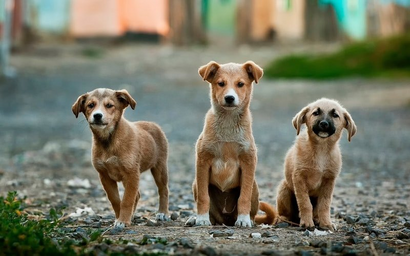Whilst we would think the pandemic affected us, as people, the most – studies show that there was an increase in a different sort of situation – a puppy pandemic. Ottilie shares studies of competitiveness within adoption, whilst also bringing back the classic issue of buying puppies when we want them, and then disregarding their needs when they become too tiresome, reminding us that puppies are not just for Christmas…or lockdowns.
The COVID-19 situation, and subsequent lockdowns throughout 2020 and 2021 have led to a huge increase in the desire for pets, especially puppies, which were seen as a way to add purpose to our daily ‘one hour of exercise’ and brought families closer as they could exercise with members of the same household. According to a study by Pets4Homes, in May 2020 for every puppy offered for sale, there were 420 perspective buyers competing for ownership. This had a direct effect on the average price of puppies for sale in 2020 of £1,875, compared with £808 in 2019. Alongside this, pet insurance policies increased by 59% according to data from LV= General Insurance.
Fast forward to December 2021, and animal shelters are overwhelmed and increasingly animals are being dumped in the streets and handed over to charities. Which is just heartbreaking. Ira Moss, the founder of the rehoming charity All Dogs Matter, speaking to the Guardian explained that French bulldogs, dachshunds, cockapoos and cavapoos, the ‘more designery dogs’ along with XL bullies; bully standing for American bulldog, XL means bred to be bigger. These dogs ‘were the top five lockdown dogs’ and are being abandoned like never before.
All Dogs Matter kennels are full to bursting; it has happened in the past few weeks, says Moss, and dauntingly there is a waiting list.
Adam Clowes, the Dogs trust operations director explains that he ‘thinks about one and a half million extra dogs were acquired in the last 18 months.’ ‘These people got dogs in a very strange time. They weren’t able to introduce their dogs to other dogs in the park, they weren’t able to access good-training classes, veterinary care was limited. So, we’re got a whole cohort of dogs that started life in not the real world and as life starts to return to normal those dogs and their owners are struggling to cope’.
The Dogs Trust Rescue Centre, according to the Guardian, have a dog in every kennel, and dogs with all their foster carers. Clowes stated that he thinks ‘we are at the start of a worrying trend. We are certainly not at the peak’.
Dr Sam Gaines, the RSPA’s dog welfare expert contends that ‘because the supply in the UK couldn’t keep up with demand, there was a surge in puppy imports, as shown by the number of certificates issued for commercial movement of dogs’. ‘These puppies that have been bred in poor conditions, likely to have been taken away from their mothers too young in age, and then transported for long periods of time and exposed to lots of stressful experiences which have a negative impact on their behaviour’.
Anna Webb, animal behaviourist and A Dog’s Life podcaster, says many of those who took on dogs during the pandemic didn’t consider the longer term responsibilities involved.
In this rather bleak situation, it is perhaps important to remember the importance pets have played over the pandemic. Dr Dam Gaines explains ‘they were there protecting our mental health and providing much-needed companionship and a reason to go outside to have daily exercise. That attachment between pets and people is incredibly strong’.
So, what can you do if you are struggling with your new lockdown pet?
Do not simply abandon your pet, seeks out appropriate re-homing strategies. Instead contact rehoming organisations who will be able to guide you.
The animal welfare charity Battersea Dogs & Cats home have also recently launched a new range of one-off virtual classes on their website for dogs aged five to eighteen months, that tackle key training areas expected to occur when dogs come out of lockdown, so if you are struggling but do not want to give up your dog this could be a great place to start.
And if you are considering a dog this Christmas make sure that you have access to a vet before buying as there are shortages caused by Brexit and Covid.

